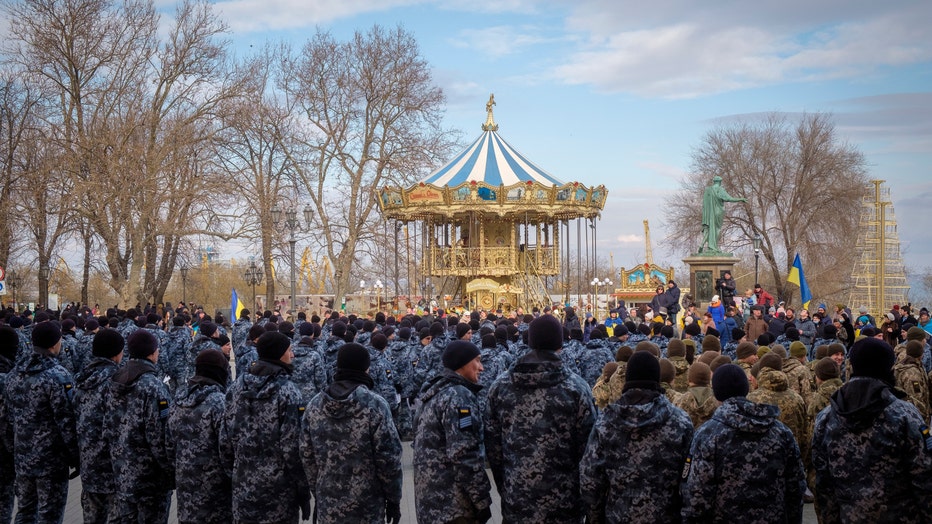Ukraine says Russian invasion not imminent, urges calm
Ukraine's leaders sought to reassure the nation that a feared invasion from neighboring Russia was not imminent, even as they acknowledged the threat is real and prepared to accept a shipment of American military equipment Tuesday to shore up their defenses.
Russia has denied it is planning an assault, but it has massed an estimated 100,000 troops near Ukraine in recent weeks, leading the United States and its NATO allies to rush to prepare for a possible war.
Several rounds of high stakes diplomacy have failed to yield any breakthroughs, and this week tensions escalated further. NATO said it was bolstering its deterrence in the Baltic Sea region, and the U.S. ordered 8,500 troops on higher alert to potentially deploy to Europe as part of an alliance "response force" if necessary.
The State Department has ordered the families of all American personnel at the U.S. Embassy in Kyiv to leave the country, and it said that nonessential embassy staff could leave. Britain said it, too, was withdrawing some diplomats and dependents from its embassy.
RELATED: Russian invasion of Ukraine concerns soaring, here’s what’s happening
In Ukraine, however, authorities have sought to project calm — and many ordinary people have expressed skepticism that there will be an invasion soon.
Speaking in the parliament on Tuesday, Defense Minister Oleksii Reznikov said that "as of today, there are no grounds to believe" that Russia is preparing to invade imminently, noting that its troops have not formed what he called a battle group that could force its way through the border.
"Don't worry, sleep well," Reznikov said. "No need to have your bags packed."
Reznikov's remarks come on the heels of multiple reassurances from Ukrainian President Volodymyr Zelenskyy and other officials. On Monday, Zelenskyy told the nation that the situation was "under control."
In an interview aired late on Monday, however, the defense minister acknowledged that "there are risky scenarios" that "are possible and probable in the future."

Police officers and Ukrainian soldiers attend a rally in Odessa, Ukraine, on Saturday, Jan. 22, 2022. Russia's troop buildup on the Ukraine border is now being cited by strategists as one of the main threats to global markets, even though President V
RELATED: US, Russia face 'critical moment' in Ukraine talks, Blinken says
Russia has said Western accusations that it is planning an invasion are merely a cover for NATO’s own planned provocations. Kremlin spokesman Dmitry Peskov on Tuesday once again accused the U.S. of "fomenting tensions" around the Ukraine, a former Soviet state that Russia has been locked in a bitter tug-of-war with for almost eight years.
In 2014, following the ouster of a Kremlin-friendly president in Ukraine, Moscow annexed the Crimean peninsula and threw its weight behind a separatist insurgency in the country's industrial heartland in the east. The fighting between Ukrainian forces and Russia-backed rebels has since killed over 14,000 people, and efforts to reach a peaceful settlement of the conflict have stalled.
In the latest standoff, Russia has demanded guarantees from the West that NATO would never allow Ukraine to join and that the alliance would curtail other actions, such as stationing troops in former Soviet bloc countries. Some of these, like any pledge to permanently bar Ukraine, are non-starters for NATO — creating a seemingly intractable stalemate that many fear can only end in war.
Moscow has also accused Ukraine of massing troops near the rebel-controlled regions in the east, with the alleged aim of retaking them by force — accusations Kyiv has rejected.
Analysts say the Ukrainian government is caught between trying to calm the nation and ensuring it gets sufficient assistance from the West in case an invasion does happen.
"Ukrainian authorities are trying to prevent destabilization and panic inside the country, hence the calming statements saying there is no threat of an imminent Russian invasion," political analyst Volodymyr Fesenko said.
"The Kremlin’s plans include undermining the situation inside Ukraine, fomenting hysteria and fear among Ukrainians, and the authorities in Kyiv find it increasingly difficult to contain this snowball," he added.
A Kyiv International Institute of Sociology poll found about 48% of Ukrainians believe an invasion in the coming months to be a real threat. But with many aware of the possibility that recent moves could also be part of information warfare, 39% said they don’t see it happening.
The nationwide poll of 1,205 people from Jan. 21 to 22 had a margin of error that did not exceed 3.2 percentage points.
Some Ukrainians are watching warily.
"Of course we fear Russia’s aggression and a war, which will lead to the further impoverishment of Ukrainians. But we will be forced to fight and defend ourselves," Dmytro Ugol, a 46-year-old construction worker in Kyiv, said. "I am prepared to fight, but my entire family doesn’t want it and lives in tension. Every day, the news scares us more and more."
Putting the U.S.-based troops on heightened alert for Europe on Monday suggested diminishing hope that Russian President Vladimir Putin will back away from what U.S. President Joe Biden himself has said looks like a threat to invade neighboring Ukraine.
RELATED: Biden predicts Russia will invade Ukraine, warns Putin country could pay 'dear price'
As part of a new $200 million in security assistance directed to Ukraine from the United States, a shipment including equipment and munitions is also expected to arrive Tuesday in Ukraine.
The U.S. moves are being done in tandem with actions by other NATO member governments to bolster a defensive presence in Eastern Europe. Denmark, for example, is sending a frigate and F-16 warplanes to Lithuania; Spain is sending four fighter jets to Bulgaria and three ships to the Black Sea to join NATO naval forces, and France stands ready to send troops to Romania.

